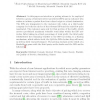Free Online Productivity Tools
i2Speak
i2Symbol
i2OCR
iTex2Img
iWeb2Print
iWeb2Shot
i2Type
iPdf2Split
iPdf2Merge
i2Bopomofo
i2Arabic
i2Style
i2Image
i2PDF
iLatex2Rtf
Sci2ools
87
Voted
NETCOOP
2007
Springer
2007
Springer
Pricing for QoS Provisioning Across Multiple Internet Service Provider Domains
In this paper we introduce a pricing scheme to be employed between a group of Internet service providers (ISPs) and a customer who wishes to initiate a packet flow from a fixed origin to a fixed destination. The ISPs are transparent to the customer who relies on a third party company for both the choice of the relevant ISPs and the unit flow price negotiated. The customer pays only for that portion of the traffic, which meets a predefined maximum tolerable total delay within the ISP networks. After taking in a fixed percentage of total profit, the third party redistributes the remaining benefits to the ISPs according to a sharing mechanism, which reflects both, the QoS the ISPs declare they will meet, as well as their real performance. The pricing emerges as the result of a Stackelberg game with the third party as the leader and the ISPs as the followers.1
Related Content
| Added | 08 Jun 2010 |
| Updated | 08 Jun 2010 |
| Type | Conference |
| Year | 2007 |
| Where | NETCOOP |
| Authors | Soheil Saberi, Roland P. Malhamé, Lorne Mason |
Comments (0)

